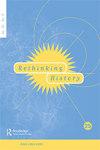平克之后的暴力史理论化
IF 0.8
2区 历史学
Q1 HISTORY
引用次数: 2
摘要
摘要平克2018年的作品《启蒙运动》延续了他早期对诺伯特·埃利亚斯对启蒙运动后人类历史的乐观解读。它复制了历史学家在他2011年的作品《我们大自然中更美好的天使》中发现的问题。然而,超越平克的理论并不需要拒绝对暴力史的理论或元历史方法。最近其他与暴力史有关的作品提供了相互竞争的理论立场和见解,这些立场和见解是它们作为历史作品取得成功的核心。这篇文章推翻了平克的说法,即埃利亚斯的作品是暴力历史学家“仅存的理论”,展示了其他历史学家是如何成功地使用这一理论的。它质疑了四种主要方法的特征性理论主张和关注点:新帝国史、比较种族灭绝研究、战争和社会史以及性别暴力史,并否定了平克关于没有其他理论传统适合研究暴力史的说法。本文章由计算机程序翻译,如有差异,请以英文原文为准。
Theorising the history of violence after Pinker
ABSTRACT Pinker’s 2018 work Enlightenment Now maintains his earlier commitment to Norbert Elias’ sanguine reading of post-Enlightenment human history. It replicates the problems that historians identified with his 2011 work, The Better Angels of Our Nature. Moving past Pinker’s theory does not, however, necessitate a rejection of theoretical or meta-historical approaches to the history of violence. Other recent works concerned with the history of violence offer rival theoretical positions and insights that are central to their success as works of history. Pushing past Pinker’s claim that Elias’ work is ‘the only theory left standing’ for historians of violence, this article demonstrates how theory has been used successfully by other historians. It interrogates the characteristic theoretical claims and concerns of four major approaches: new imperial history, comparative genocide studies, histories of war and society, and the history of gendered violence, and negates Pinker’s claim that no other theoretical tradition is appropriate for the study of the history of violence.
求助全文
通过发布文献求助,成功后即可免费获取论文全文。
去求助
来源期刊

Rethinking History
Multiple-
CiteScore
1.20
自引率
0.00%
发文量
26
期刊介绍:
This acclaimed journal allows historians in a broad range of specialities to experiment with new ways of presenting and interpreting history. Rethinking History challenges the accepted ways of doing history and rethinks the traditional paradigms, providing a unique forum in which practitioners and theorists can debate and expand the boundaries of the discipline.
 求助内容:
求助内容: 应助结果提醒方式:
应助结果提醒方式:


